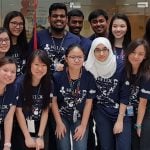Greetings from Taipei! I am Brandon Mong Guo Jie and am currently working as a postdoctoral researcher at the most pre-eminent research center in Taiwan – the Academia Sinica. Similar to the Biopolis in Singapore, Academia Sinica is composed of 24 Institutes (including the Institute of Biomedical Sciences) and 8 Research Centers (including the Biodiversity Research Center).
It all started when I joined IMU in 2010 (Biomedical Science; BM1/11). Back then, biodiversity was one of my favorite modules in the programme. Why? Because it was the only module with a field trip! We went to a beautiful sandy beach and collected some green algae (seaweed) for species identification. My classmates and I really enjoyed that field trip.

Another module that I enjoyed the most was parasitology. The various shapes of tiny little parasitic oocysts and worms that can be seen under a light microscope sparked my interest in studying them. This led me to my internship at the Faculty of Medicine, University of Malaya in 2014. I applied what I had learned in IMU to my internship research projects (e.g., polymerase chain reaction, PCR primer design, species identification, and etc.).
My internship supervisor (Dr Veeranoot) was delighted with my performance during the internship and gave me the opportunity to be involved in various research projects. The comprehensive internship allowed me to explore a variety of parasites, including soil-transmitted helminths (STH), water-borne parasites, Malaria parasites, and Toxoplasma gondii, eventually triggered my interest in research and strengthened my research skills. Apart from research, my internship supervisor taught me to be compassionate to stray animals. I assisted in a trap-neuter-release (TNR) programme and a few charitable events to raise funds for AnimalCare Society.
My involvement with stray animals led me to further my study in wildlife conservation, particularly arthropods which are widely ignored in conservation biology.
I started my MSc project in 2015, and it involved the application of metabarcoding (the coupling of high-throughput sequencing and DNA-based species identification) to assess important ecological questions relating to the maintenance of arthropod biodiversity and ecosystem functioning in view of the threat of climate change. Under Dr John James Wilson’s supervision, I established a user-friendly bioinformatic pipeline to analyse the data.
I was able to secure funding from my university to participate in the Sixth metabarcoding spring school at Kunming (China) for meta-analysis training after being selected by the committee members.
I attended two international conferences (Toronto, Canada; Bangkok, Thailand) and was invited to another international seminar (Phitsanulok, Thailand) to share my research with other scientists and this has improved my communication skills.

After completion of my MSc programme in 2017, I enrolled in the Taiwan International Graduate Program (TIGP) at the Academia Sinica (Taipei, Taiwan) to further my study in biodiversity, particularly gut microbiota. I wanted to apply my interdisciplinary knowledge (biomedical science and biodiversity) into my PhD. study, so my supervisors (Dr Daryi Wang and Dr Chien-Chang Chen) recommended a research project to me, entitled “The Impact of Chronic Pain on the Structure and Stability of Gut Microbial Community in Mouse Models”.
My PhD project involved the application of microbial interaction networks to identify gut microbes that play important roles in mice with chronic pain; spared-nerve injury (SNI) model that mimics neuropathic pain and acid-induced muscle pain (AIMP) model which mimics fibromyalgia. After completion of my coursework (18 credits) in 2018, I applied for the National Taiwan Normal University (NTNU) Scholarship for Outstanding Doctoral and Graduate Students and was successfully awarded with a scholarship. Before I graduated with a PhD, I have already published 12 peer-reviewed articles (7 first authorship, 5 co-authorship), with a total of 280 citations. Due to my outstanding research work, I was awarded with AS-TIGP Research Performance Fellowship in 2021.
Currently, I am working as a postdoctoral researcher in Dr Yin-Ru Chiang’s laboratory. Dr Chiang is an expert in anaerobes and extremophiles, microbial metabolic diversity, microbial ecophysiology, and integrated multi-omics. By using bioinformatics approaches, I identified several bacterial species that can metabolize certain steroid in humans. I am looking forward to be involved in multiple research projects where I can apply my interdisciplinary knowledge for novel scientific discoveries.
Related article: Postgraduate Studies for IMU Biomedical Science Alumnus









